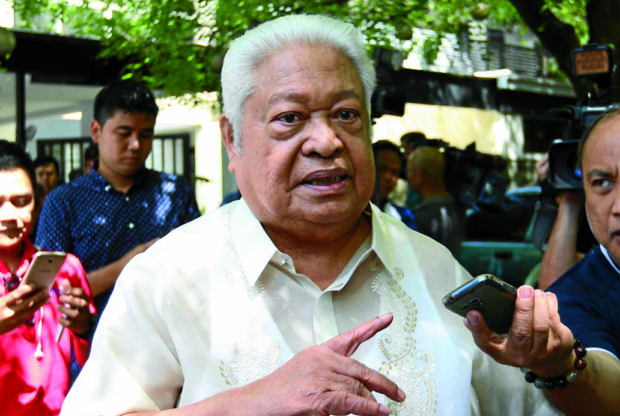No sufficient factual basis for Duterte’s martial law, says Lagman

Rep Edcel Lagman EDWIN BACASMAS
There are falsities in President Rodrigo Duterte’s basis for declaring martial law in Mindanao, Representative Edcel Lagman told the Supreme Court on day one of the three-day oral argument on the validity of Proclamation 216.
The Supreme Court has begun the three-day oral argument which sought to nullify Duterte’s 60-day martial law for being unconstitutional.
“We submit that there is no sufficient factual basis [on the declaration of martial law] and many of the facts are false, inaccurate and contrived,” Lagman explained to Associate Justice Mariano Del Castillo.
Del Castillo questioned Lagman on his basis for alleging that the situation in Marawi does not amount to rebellion when he has not personally seen the situation on the ground.
“How can you dispute the findings [of the military] on sufficiently of factual basis for the proclamation?” Del Castillo asked.
Article continues after this advertisementLagman said they need not be in Marawi to know the situation because based on Proclamation 216 itself and the report submitted to Congress, there is not enough basis for such a declaration.
Article continues after this advertisement“Except for self-serving conclusions of fact and law, neither Proclamation 216 nor the President’s report to Congress laid down the factual basis for the need to secure public safety. The serious gravity of the circumstances requiring the protection of public safety proximate to the issuance of the proclamation 216 is belied by the uniform statement by the military of the situation in Marawi hours before and contemporaneous with the declaration of martial law and suspension of the writ of habeas corpus,” Lagman said.
Lagman cited the following pronouncements by government authorities prior to the declaration of martial law:
- According to responsible military officials, the situation in Marawi was under control and the military was on top of the situation before, shortly before and at the time the Proclamation 216 was issued;
- Four hours before President Duterte issued Proclamation 216 in Moscow, National Security Adviser Hermogenes Esperon Jr. categorically said that the Armed Forces of the Philippines was in full control of the situation;
- About two hours before the proclamation, AFP Chief of Staff Eduardo Año, in a television interview said the military was in full control of the situation in Marawi;
- One hour before the issuance of Proclamation 216, the military reiterated that they are on top of the situation, and;
- Twenty minutes before issuance of Proclamation 216, Col. Eduardo Arevalo asserted in a briefing that the situation in Marawi has stabilized.
“Verily, not only there was no sufficient basis of rebellion, there was also no factual anchorage for this necessity of imposing martial law to secure public safety. President Duterte should have validated the situation on the ground upon arriving home, exercise due discretion,” Lagman added.
Justice Del Castillo noted that President Duterte has access to the government’s vast intelligence network.
“Access does not mean to say that what he has accessed is valid,” Lagman said.
Lagman also mentioned the erroneous pronouncements by the government which include the beheading of the Marawi police chief who later on was interviewed by the media, the report that a hospital and a school were taken over by the terrorist.
The oral argument will resume at 2 in the afternoon. JE/rga